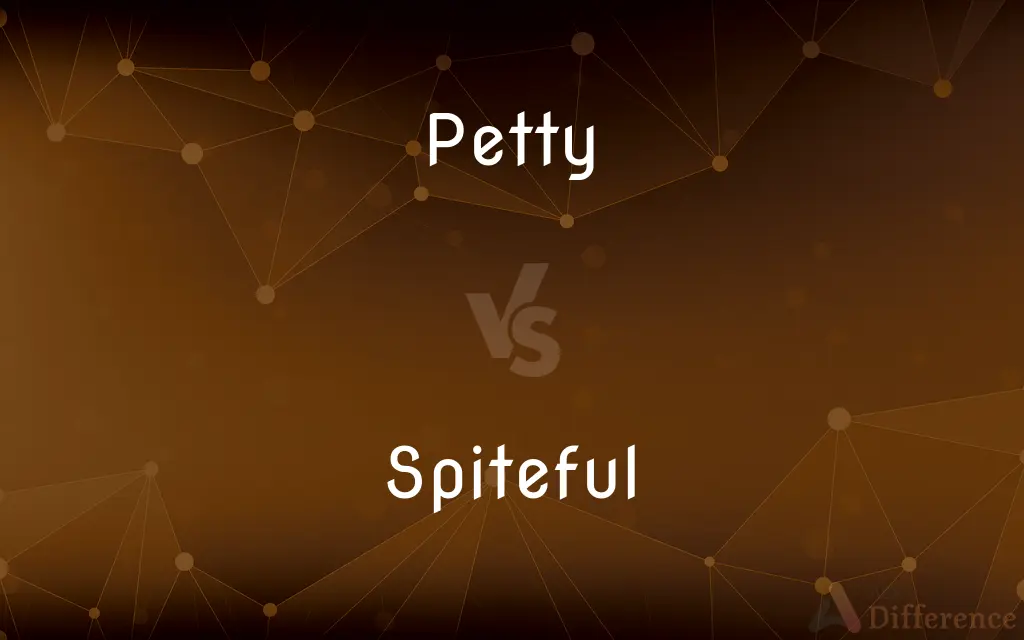Petty vs. Spiteful — What's the Difference?
Edited by Tayyaba Rehman — By Fiza Rafique — Updated on October 27, 2023
Petty refers to trivial matters or narrow-mindedness, while Spiteful denotes a desire to hurt or offend someone out of malice.

Difference Between Petty and Spiteful
Table of Contents
ADVERTISEMENT
Key Differences
Petty and Spiteful are two adjectives that, while related to negative human behavior, portray different shades of it. Petty revolves around the idea of triviality or insignificance. Someone labeled as Petty might pay excessive attention to minor details or exhibit a narrow-minded attitude. Their concerns may seem trivial or secondary in the larger scheme of things. They might fuss over the smallest oversight, making mountains out of molehills.
Spiteful, however, is a more malicious term. It refers to an intent to harm or offend someone, often due to jealousy or resentment. When someone is Spiteful, they are acting with a specific purpose to inflict pain, either emotionally or physically. It's a deliberate act of meanness, often rooted in personal vendettas or deep-seated grudges.
It's crucial to recognize that while all Spiteful acts might be seen as Petty, not all Petty behaviors are Spiteful. For instance, someone who constantly corrects minor grammatical mistakes might be considered Petty, but not necessarily Spiteful. Conversely, someone who spreads rumors about a colleague out of jealousy is manifestly Spiteful.
Another distinction is the depth of emotion associated with each term. Petty behaviors often arise from irritability, insecurity, or a tendency to sweat the small stuff. On the other hand, Spiteful actions are fueled by deeper emotions like hatred, envy, or the thirst for revenge. It's this intent to harm that sets Spiteful actions apart.
Lastly, in terms of personal relationships, Petty squabbles might occur frequently among friends or family over inconsequential matters but are often quickly forgotten. Spiteful actions, given their intent, can lead to long-term rifts and can seriously damage relationships, requiring greater effort to heal.
ADVERTISEMENT
Comparison Chart
Definition
Concerned with trivial matters.
Intent to harm or offend out of malice.
Emotional Depth
Often superficial or minor irritations.
Deep-seated negative emotions like envy or hatred.
Impact
Usually temporary and easily overlooked.
Can lead to prolonged conflict or damage.
Examples
Nitpicking, small grievances.
Spreading rumors, deliberate acts of harm.
Grammatical Role
Adjective describing trivial concerns.
Adjective describing malicious intentions.
Compare with Definitions
Petty
Of minor importance.
It was just a Petty disagreement.
Spiteful
Fueled by resentment or envy.
His Spiteful actions came from jealousy.
Petty
Trivial or insignificant.
Petty issues shouldn't ruin our day.
Spiteful
Showing malicious intent.
His Spiteful remarks hurt her feelings.
Petty
Small-scale or secondary.
He held a Petty position in the company.
Spiteful
Desiring to hurt or harm.
She was Spiteful after the breakup.
Petty
Concerned with trivial matters.
She was Petty about the way the dishes were arranged.
Spiteful
Maliciously vengeful.
She spread rumors out of Spiteful intent.
Petty
Of small importance; trivial
A petty grievance.
Spiteful
Deliberately harmful.
Spiteful comments can damage relationships.
Petty
Showing an excessive concern with unimportant matters or minor details, especially in a narrow-minded way
Petty partisanship.
Spiteful
Showing or caused by malice
The teachers made spiteful little jokes about me
Petty
Of lesser importance or rank; subordinate
A petty prince.
Spiteful
Filled with, prompted by, or showing spite; malicious.
Petty
(Law) Variant of petit.
Spiteful
Filled with, or showing, spite; having a desire to annoy or harm.
Petty
Having little or no importance.
A petty fault
Petty squabbles
Spiteful
Filled with, or showing, spite; having a desire to vex, annoy, or injure; malignant; malicious; as, a spiteful person or act.
Petty
Of persons or their behaviour: marked by or reflective of undesirably limited interests, sympathies, or views; begrudging, selfish, small-minded; also, preoccupied with subjects having little or no importance and not mindful of broader concerns.
Such literature may well be anathema to those who are too docile and petty for their own good.
That corporation is only slightly pettier than they are greedy, and they are overdue to reap the consequences.
Spiteful
Showing malicious ill will and a desire to hurt; motivated by spite;
A despiteful fiend
A truly spiteful child
A vindictive man will look for occasions for resentment
Petty
(historical) Of or relating to the lowest grade or level of school; junior, primary.
Petty
Little or small in size.
Petty
Secondary in importance or rank; minor, subordinate.
Petty cash
Petty officer
Petty
An outbuilding used as a lavatory; an outhouse, a privy.
Petty
(historical) A class or school for young schoolboys.
Petty
A little schoolboy, either in grade or size.
Petty
Little; trifling; inconsiderable; also, inferior; subordinate; as, a petty fault; a petty prince.
Like a petty godI walked about, admired of all.
Petty
Inferior in rank or status;
The junior faculty
A lowly corporal
Petty officialdom
A subordinate functionary
Petty
(informal terms) small and of little importance;
A fiddling sum of money
A footling gesture
Our worries are lilliputian compared with those of countries that are at war
A little (or small) matter
Mickey Mouse regulations
A dispute over niggling details
Limited to petty enterprises
Piffling efforts
Giving a police officer a free meal may be against the law, but it seems to be a picayune infraction
Petty
Contemptibly narrow in outlook;
Petty little comments
Disgusted with their small-minded pettiness
Petty
Narrow-minded.
He was too Petty to appreciate the broader picture.
Common Curiosities
Can Petty disagreements lead to serious conflicts?
If repeatedly occurring or coupled with Spiteful intentions, yes.
Is being Petty always negative?
Mostly, but it can be harmless or just annoying in some contexts.
Why would someone be Spiteful?
Often due to jealousy, resentment, or previous grievances.
Is being Spiteful a sign of insecurity?
It can be, as it often stems from envy or feelings of inadequacy.
Can one outgrow Petty behaviors?
Yes, maturity and self-awareness can reduce Petty tendencies.
Do Petty individuals focus on details?
Often, but they focus on trivial or insignificant details.
Can someone be both Petty and Spiteful?
Yes, one can focus on trivial matters with a malicious intent.
Is Spiteful behavior harmful?
Yes, it often seeks to harm or offend someone deliberately.
Is nitpicking a Petty behavior?
Yes, it's an example of focusing on trivial flaws or errors.
Can Spiteful actions be forgiven easily?
It depends on the action and individual, but they can leave lasting hurt.
How can one avoid being Spiteful?
By managing negative emotions and seeking constructive outlets.
Can Spiteful behavior be passive-aggressive?
Yes, Spiteful acts can be covert or indirect.
Are Petty concerns unimportant?
They might seem so in the broader context but can be significant to some.
Is being meticulous the same as being Petty?
Not necessarily. Meticulousness is about thoroughness, not triviality.
Is Spiteful behavior a personality trait?
It can be a recurring behavior, but it's not fixed and can change.
Share Your Discovery

Previous Comparison
Truth vs. Knowledge
Next Comparison
Cuckoo vs. NightingaleAuthor Spotlight
Written by
Fiza RafiqueFiza Rafique is a skilled content writer at AskDifference.com, where she meticulously refines and enhances written pieces. Drawing from her vast editorial expertise, Fiza ensures clarity, accuracy, and precision in every article. Passionate about language, she continually seeks to elevate the quality of content for readers worldwide.
Edited by
Tayyaba RehmanTayyaba Rehman is a distinguished writer, currently serving as a primary contributor to askdifference.com. As a researcher in semantics and etymology, Tayyaba's passion for the complexity of languages and their distinctions has found a perfect home on the platform. Tayyaba delves into the intricacies of language, distinguishing between commonly confused words and phrases, thereby providing clarity for readers worldwide.















































